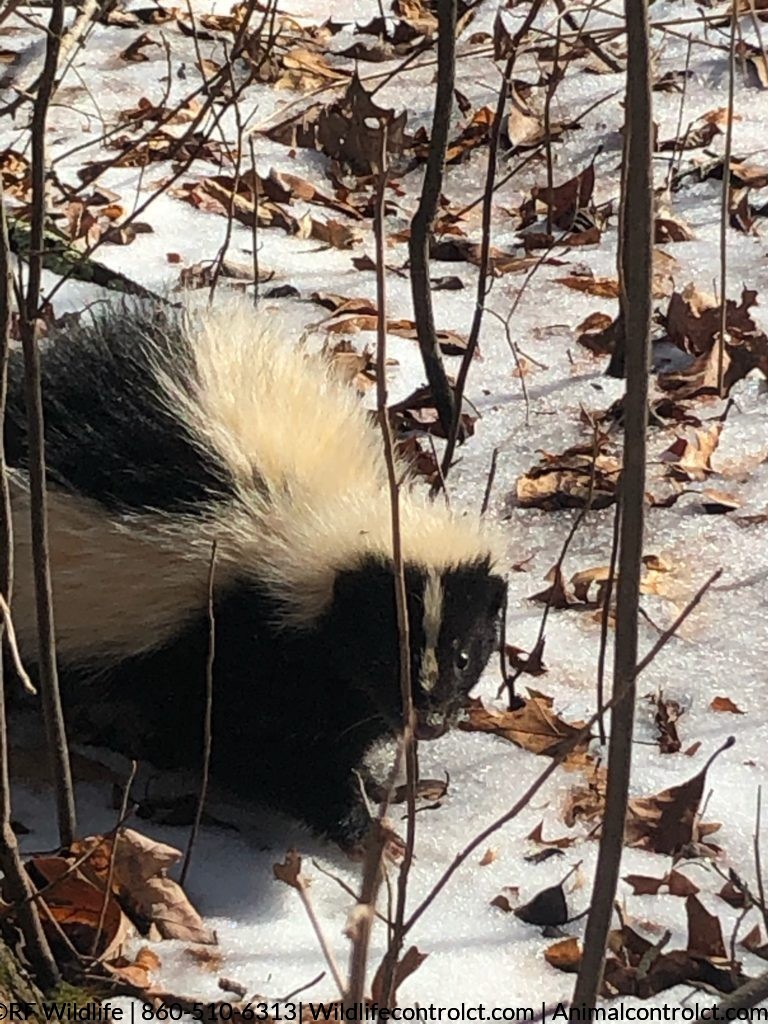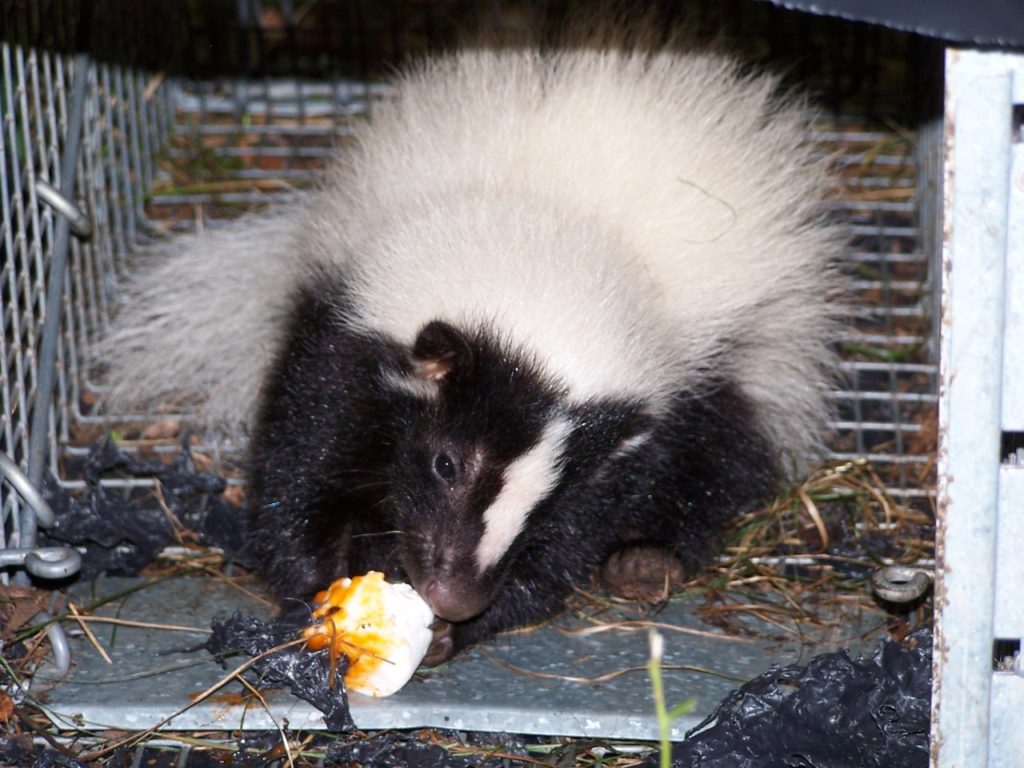
Skunks frequently choose to reside near or even beneath people’s homes. This can be particularly worrisome for pet owners, as most requests for skunk removal are initiated after a pet has been sprayed by a skunk. Skunks primarily spray when they are startled, mating, or when their young are playing. These behaviors become more apparent when a skunk is living in close proximity to humans.
The ideal approach to managing skunks is to avoid encountering them in the first place. If you’re reading this, you probably already have a skunk control issue and need to remove the skunks before implementing the preventive measures suggested here. To minimize the need for dealing with skunks in the future, follow the recommendations on this page.
Skunk Proof Sheds and Decks
Skunk-Resistant Low Shelters (Sheds, Decks)
Skunks often build their burrows beneath human-made structures near residential areas. They are attracted to spaces underneath sheds, decks, porches, stairs, beach houses, and mobile homes, as these areas offer overhead protection and a sense of security. Skunks prefer to dig their burrows under structures that provide such cover.
To prevent skunks from accessing these locations, use hardware cloth or other wire mesh materials for fencing. Start by digging a trench close to the structure, approximately 16-24 inches wide. This will enable you to bury the hardware cloth underground and bend it outwards in an L-shape. When skunks attempt to dig down, they will encounter the wire mesh, which will deter them from digging any further. If skunks cannot find suitable cover for burrowing, they are less likely to establish their homes near your residence.
Maintaining a Skunk-Free Yard
Keep Your Yard Tidy and Open Skunks, like many other pests, prefer to navigate areas that offer shelter and concealment. They tend to use brush, shrubs, fallen branches, woodpiles, and other forms of cover to safely explore your yard, hidden from predators such as the great horned owl. The more concealed they feel, the bolder their actions become. To deter skunks and other pests, maintain a clean and open yard. The goal is to make these creatures feel exposed while on your property. The fewer hiding spots they have, the more effective your efforts in maintaining a skunk-free yard will be.
Maintain Clear Perimeters for Skunk Deterrence
Skunks are notorious for traveling along edges or perimeters, such as those found along forests, hedgerows, fence lines, and similar environments. These areas provide skunks with convenient access to hiding spots and safe passages, making it more likely that they will venture closer to your home if such boundaries are nearby. Unfortunately, many homes feature decks with ornamental hedges or bushes around them, which creates an ideal habitat for skunks to reside in.
To mitigate the risk of skunks finding a home near your property, it is essential to maintain a clear perimeter. Start by keeping ornamental plants near your home well-trimmed and away from low-cover areas. This will help to reduce the potential hiding spots that skunks find appealing. Additionally, avoid allowing branches to touch your home, if possible. By doing so, you can help to create a less inviting environment for skunks to explore.
The ideal perimeter around a home consists of a 24-inch clear space between the home and any form of cover. This buffer zone will help to deter skunks from getting too close. To further enhance the effectiveness of this barrier, consider adding light-colored crushed stone to the 24-inch area. Not only will this make the space less inviting to skunks, but it will also improve the visibility of the area for predators such as hawks and owls.
By maintaining a clear perimeter and providing a clear line of sight for natural predators, you can effectively use Mother Nature’s rodent suppression team to your advantage. This will result in a reduced likelihood of skunks venturing close to your home, and ultimately, a safer and more pleasant living environment for you and your family.

Safeguard Your Garbage from Skunks
Skunks are omnivorous creatures and have a diverse diet, including many of the same foods humans consume. Although skunks rarely rummage through garbage cans independently, they often benefit from the actions of other wildlife, such as raccoons or bears, that tip over and spill the contents of trash cans. Additionally, if you compost, consider using composting containers, as skunks are known to dig through traditional compost heaps in search of insects and food scraps.
On occasion, skunks may find themselves trapped in trash cans, particularly when these containers are placed too close to retaining walls. To prevent this scenario, ensure that your trash cans are positioned at least 24 inches away from walls or other surfaces that could facilitate access. Skunks are not proficient climbers, and it is highly unlikely that they would scale a trash can without assistance from other structures.
To effectively keep skunks out of your garbage, it is essential to secure your trash cans from other wildlife, such as raccoons and bears. This can be achieved by using garbage cans with tight-fitting lids or locking mechanisms, placing heavy objects on top of the lids, or storing the cans in an enclosed area, such as a garage or shed, until garbage pickup day.
By taking these precautions, you not only deter skunks from rummaging through your trash but also minimize the likelihood of attracting other pests. In doing so, you help maintain a cleaner and safer environment around your home, which can contribute to a more enjoyable outdoor experience for you and your family.
Grub Control for Skunk Deterant
Skunks have a fantastic sense of smell. Skunks can smell grubs underground and will dig a cone shaped hole to get them. Grubbing skunks will spend hours on your lawn. Grubs are a favorite food of skunks. Unlike moles getting rid of the grubs will deter skunks who are grubbing. It is truly worth looking into a grub control service as a method of deterring skunks. I never advocate the use of pesticides, but nematodes are very good for grub control. Skunks will dig up and eat earthworms and roots, so test dig to be sure grubs are an issue in your lawn first. Grub control doesn’t work for moles, but it does work for skunks.
Remove other Food Sources
Skunks will eat just about anything, grubs are a favorite but so are bird feeders. Birds are messy eaters, and no matter if your feeders are squirrel proof or not seeds end up on the ground. Skunks will readily eat the seeds dropped by our feathered friends. A way to prevent this is to put a table under the bird feeder to catch the seeds birds discard. This will not eliminate all seeds from hitting the ground, but getting people to stop feeding is an impossible yet preferable task.
Try to identify every possible food source around your property. Fallen fruits from trees and berry bushes, acorns and other nuts should be cleaned up as much as possible. Do not leave dog or cat food out, this is just asking for problems. The less food you leave out for skunks to scavenge the less likely they will be living near your home.
If you end up with a skunk living on or around your property, don’t panic but also do not try to approach the skunk. Give RF Wildlife a call we can safely and humanly remove the skunk from your property and 99% of the time the skunk will never spray. If you come face to face with a skunk do not panic. Never move quickly around a skunk unless you are curious what it is like to get sprayed. Skunks do not see great, but hear fine and have the nose of a bloodhound. Speak softly to a skunk like you would a scared puppy, and slowly back away. Give us a call at 860-510-6313 and we will remove the skunks and come up with a permanent solution to fit your needs.
